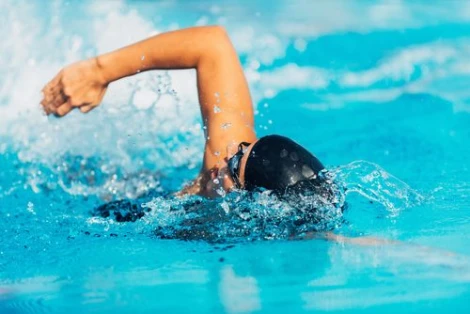
Swimming is not only a great recreational sport, it’s a healthy physical activity that’s fun for all ages. But, it’s important to remember that water can be dangerous and all it takes is a couple of inches of water for an infant or small child to drown. Before you head to the lake, river, beach, hot tub, or swimming pool, be aware of these swimming safety tips.
- Never let children swim without adult supervision, even if the children know how to swim.
- Never let an older child supervise a younger child while swimming.
- Only swim in areas where lifeguards are present, but you can’t solely rely on lifeguards. You still have to supervise your children around water when lifeguards are present.
- Never swim alone; always swim with a buddy, especially around bodies of natural water.
- When boating, always wear a U.S. Coast Guard-approved life jacket.
- Make sure your children take swimming lessons and become highly-skilled swimmers. Swimming lessons can save their lives.
- If you are an unskilled swimmer or if you can’t swim, take adult swimming lessons so you learn how to be a good swimmer.
- If you have a swimming pool in your backyard, secure it with proper barriers, such as a locking fence. Even if you don’t have kids, neighborhood children can sneak into your pool and drown.
- If you’re near a pool or another body of water and a child is missing, check the water first! Seconds count when it comes to near-drowning accidents.
- When having fun in the sun, apply at least SPF 15 sunscreen 30 minutes before sun exposure and reapply throughout the day.
- If you hear thunder or see lightning, get out of the water.
- Do not swim in river or ocean currents.
- When swimming, keep a safe distance from slides and diving boards and never swim under them.
- If you can’t see the bottom because it’s cloudy, don’t swim there. Stay in shallow areas with visibility.
- Avoid swimming at night in areas without good lighting.
- Stay out of the water when you’re tired, overheated, very cold, or intoxicated.
- Avoid drinks containing alcohol and caffeine as they are dehydrating. Alcoholic beverages can increase the risk of drowning because they can impair judgement.
- Enroll in first aid, water safety, and home pool safety courses provided by the Red Cross, community colleges, or recreation centers.
Swimming can be a safe, fun, healthy activity when you follow these swimming safety tips. If you do find yourself injured in a swimming or boating accident, please contact Jones & Swanson to schedule a free case evaluation with a Marietta injury lawyer.









